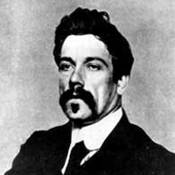
public domain
John Millington Synge
Playwright
Biography
John Millington Synge
John Millington Synge was born in County Dublin, April 1871. His family was upper-middle class Protestant, with a respectable history of success in law, religion, and education. When Synge was a baby, his father died of smallpox, and the family moved closer to his mother's extended family. Synge's childhood was generally happy, and he was afforded a private education in Dublin and Bray. At Trinity College, he initially studied music, but then pursued literature.
During college, Synge joined the Dublin Naturalists' Field Club and began reading Charles Darwin. This scientific examination inspired his sense of culture, politics, and Irish Nationalism. He joined the Irish League for a year, but left as he wanted to avoid the militarism of the movement. He visited the Aran Islands, an experience that would impact and inspire his dramaturgy and philosophy of Irish identity. He published his book The Aran Islands in 1901.
In 1896, John Millington Synge met William Butler Yeats, Lady Gregory, and George William Russell. Together, they founded the Abbey Theatre in Dublin. As a part of the Irish Literary Revival, they promoted Irish peasantry and folklore. His plays Riders to the Sea and The Shadow of the Glen were based on his time in the Aran Islands. But Synge's most notorious play was The Playboy of the Western World. The play's problematic portrayal of the Irish peasantry and Irish womanhood led to riots in the streets of Dublin at its premiere.
At only 38 years old, Synge developed Hodgkin's disease and died as he was finishing his final play, Dierdre of the Sorrows. The play was finished by Yeats and staged in 1910. Despite his short life, Synge was instrumental in developing the national culture and identify of Irish Literature.
Known For
Shows
Shows associated with John Millington Synge
Monologues
Monologues from shows associated with John Millington Synge
Songs
Songs from shows associated with John Millington Synge
Scenes
Scenes from shows associated with John Millington Synge
Quizzes
Quizzes associated with John Millington Synge
Learning Modules
Learning modules associated with John Millington Synge
Additional Information
N/A